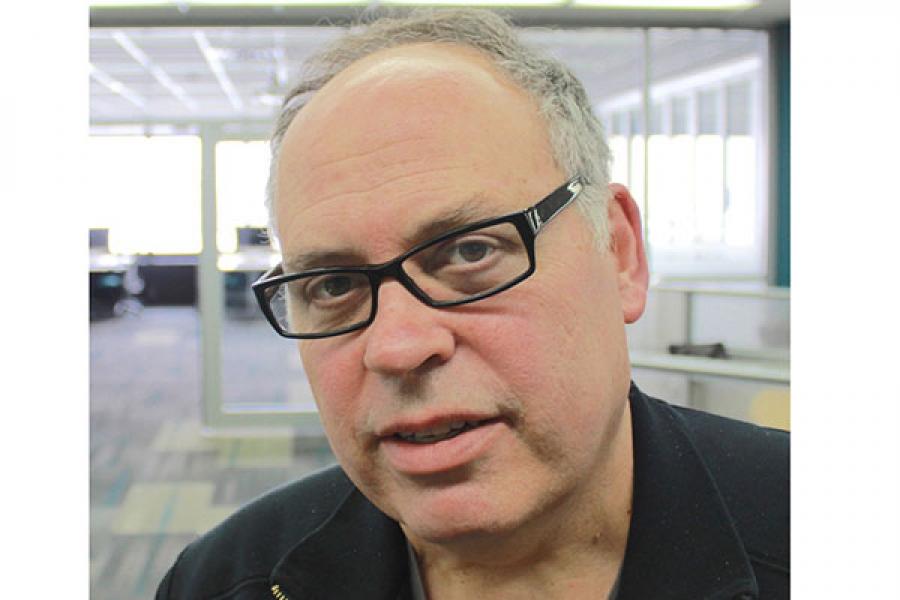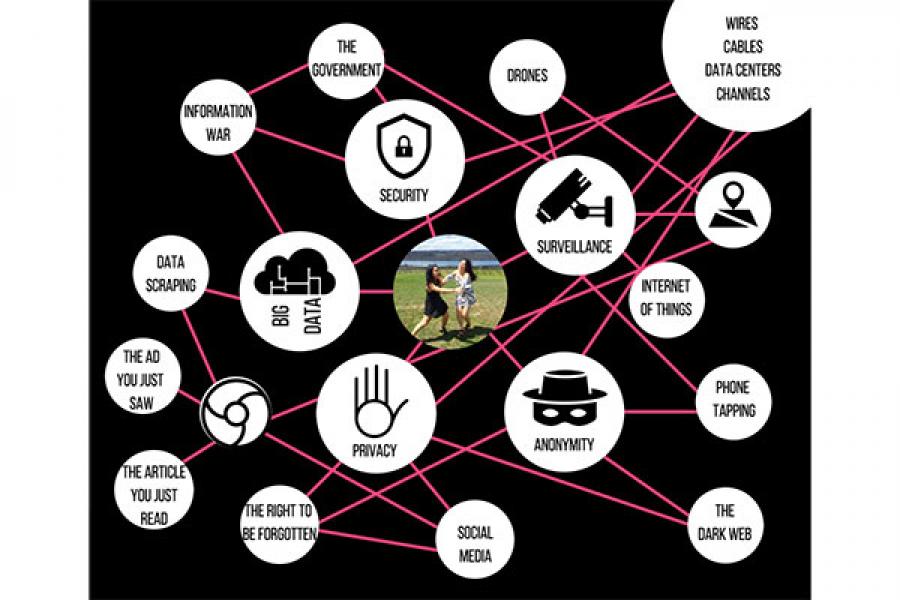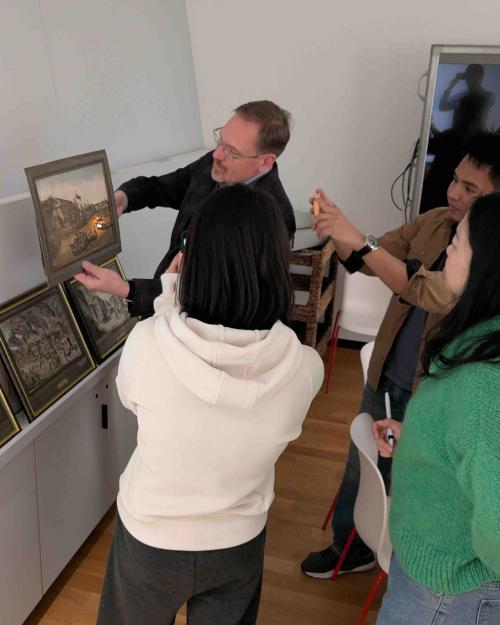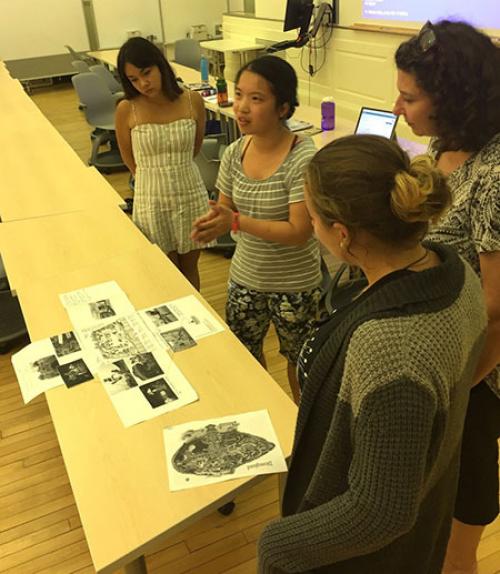A 21st century learning approach requires more than rows of fixed seats, says Jon McKenzie. In a new transdisciplinary pedagogy that encourages active learning, McKenzie has combined the kinds of conceptual, aesthetic, and technical learning found in seminar, studio, and lab spaces into an approach he calls “StudioLab.”
“In traditional liberal arts, different learning spaces are siloed into the areas of humanities and social sciences, art and design, and science and engineering. My StudioLab approach uses media studios that convert quickly from seminar to studio to lab, enabling students to integrate critical thinking, aesthetic creation, and media production,” says McKenzie, the Arts & Science Dean’s Fellow for Media and Design and visiting professor of English.
The secret, says McKenzie, is putting furniture on wheels. Movable furniture allows for different formats, such as seating the students in rows to teach a software program then breaking them into small groups for team-based projects. A lot of technology isn’t necessary, other than a projector, because students bring their own computers into the space. McKenzie’s media studios are designed as collaborative environments, even when students are working on individual projects.
StudioLab Pedagogy
The StudioLab pedagogy is designed to teach students to create “transmedia knowledge,” in which content is shaped across different media forms. McKenzie offers the example of a research paper, which uses a particular aesthetic form to convey logical clarity (including an abstract, an introduction, and a description of methodology). But the same research might be presented in Powerpoint to a potential donor or Comic Life for community members.
McKenzie, who has been developing his pedagogical method for many years, says he likes to teach several different design frames so students can reflect on the differences. “We’re trained primarily in one medium, the audiovisual medium of the alphabet,” he explains. “These are little graphics we learn to translate into words and sounds in our head. We’re so naturalized into this medium that we don’t even realize we’re doing it.”
Jon McKenzie
The StudioLab pedagogy uses small critical design teams to train students to think beyond the traditional media forms. The design process mixes critical thinking with tactical media and design thinking. McKenzie notes that though most disciplines are already transmediated – scientists create scientific posters, for example, and everyone uses PowerPoint at conferences -- not much study and training are put into learning media other than print.
Even familiar software often offer more power and creative possibilities than most people realize, says McKenzie. “You can do great things in Word, and Powerpoint is very powerful. Most people don’t know that when you’re giving a presentation in PowerPoint you can hit the record button and it will record your voice and the image on video,” transforming your presentation into a new medium.
Social Activism and Tactical Media Design
This fall, McKenzie is teaching ENGL 4705/COML 4281, Social Activism and Tactical Media Design, using an active learning classroom in Martha Van Rensselaer Hall designed by students in the College of Human Ecology. The class mixes studio, lab, and seminar-based activities to explore theories and practices of social activism and tactical media through hands-on critical engagement with human-centered design, “arguably the transmedia rhetoric of the global creative economy,” says McKenzie. He draws on contemporary fields of human-computer interaction and media theory to show how artists and activists use digital media to create social engagement.
“Critical design and media production, alongside critical thinking and writing, are essential elements of being a creative and productive member of contemporary culture and 21st-century civic society,” explains McKenzie in his syllabus. “The ability to think critically and creatively, to analyze and to make, and to communicate ideas and experiences across diverse media to different audiences will serve students in any field they enter.”
An information architecture map of the book "Deep Lab" by the feminist art activist group Deep Lab, created by Catherine Giese, a student in Mckenzie's Social Activism and Tactical Media Design class
The students practice human-centered design via smart media and design thinking, says McKenzie, using as models the Guerrilla Girls, Banksy, Reverend Billy, and similar groups. He defines “smart media” as emerging genres of digital communication such as TED talks, theory comix, and video essays, forms that combine traditional scholarship and contemporary media culture.
“Design thinking is a collaborative, interdisciplinary problem-solving approach to social innovation, organizational change, and product development that has been used in design, engineering, and education industries,” he says.
In their first project, students role-play as critical design firms to research and produce a multimedia proposal for a museum installation. For their second project, students produce individual multimedia proposals for a similar project of their own choice. In addition, students are assigned daily readings and materials about which they write conceptual thumbnails summarizing main arguments, defining critical concepts, and posing critical questions. They also post blog/journal content weekly on their own professional websites.
Workshops Around the World
McKenzie has done workshops around the world based on his research in performance and media, drawing on the fields of performance studies, human computer interaction, experience design, literary theory, and information architecture and design. At Cornell McKenzie has given workshops on transmedia knowledge for the Office of Engagement Initiatives and Cornell University Library’s Digital Humanities Initiative. He also offered a workshop on "Communicating Research for Different Audiences through Transmedia” and is co-organizer of the Knowledge Matters Fellowship sponsored by the Office of Faculty Development and Diversity, Office of Engagement Initiatives, Center for Teaching Innovation, and the Cornell University Library.
McKenzie is the author of “Perform or Else: From Discipline to Performance,” which focuses on cultural, organizational, and technological performance in post-disciplinary societies; he is also co-editor of “Contesting Performance: Global Sites of Research.” His work has been translated into a half-dozen languages. His current book project is “StudioLab Manifesto: Critical Design for Liberal Arts” with Alainya Kavaloski; he will present on StudioLab at the SXSW EDU Conference & Festival in March, 2018. His website is labster8.net.






